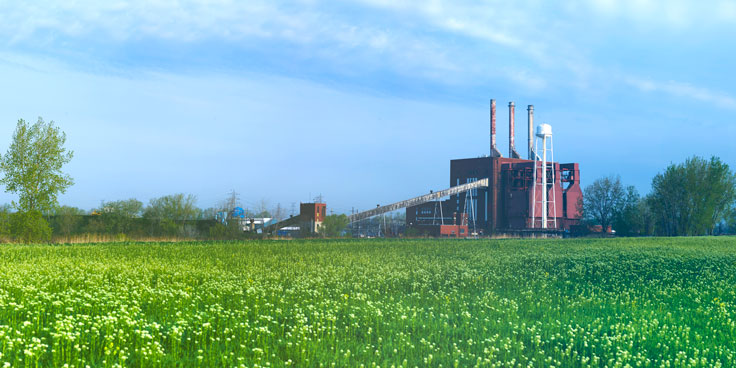-
Located on the shore of Saginaw Bay, the Weadock Plant pumped out power for more than 75 years.

-
Massive excavating machines are safely demolishing the historic Weadock Plant near Bay City.

-
Bay City native Bill Johnson worked at Weadock for 40 years before joining the team that’s tearing it down.

-
Weadock’s demolition is slated for December 2019 completion.

-
Paint peeling from one of Weadock’s once powerful generating turbines.

-
In late winter 2019, about half the main structure was gone.

-
We are safely abating all environmental issues as we prepare the site for potential redevelopment.

Account & Billing
View or pay bill
Billing and Payment
Energy dashboard
Payment Plans & Assistance
Residential Rate Options
Start, Stop or Transfer Service
Account Details
Savings & Clean Energy
Save Money & Energy
Rebates & Discounts
Compare programs
Renewable Energy
Electric Vehicles
Energy Supply Plan
Online Store
Outages & Safety
Report an issue
Safety
Outage Credits
Scheduled Outages
Tree Maintenance
Weadock Demolition Story
Turning Back Time
Safe demolition of historic coal plant prepares site for bright future
Up close, the giant excavators tearing down the historic Weadock power plant near Bay City feel incredibly lifelike.
Engines roaring, the powerful machines bob up and down, slamming into the massive – but quickly disappearing – steel and brick structure on the shore of Saginaw Bay.
To Bill Johnson’s eye, they resemble a pack of dinosaurs at feeding time.
“It’s like Jurassic Park out here,” Johnson says with a grin.
That’s a fitting image because Johnson and our decommissioning team are working to turn back time by safely demolishing the plant, abating any environmental issues and preparing for potential redevelopment. We are committed to leaving the site better than we found it.
“It’s crazy to think about, but some day they’re not going to know we were ever here,” said Johnson, who worked at Weadock for 40 years before joining the team tasked with taking down the plant that faithfully pumped out electricity for more than 75 years.
Honoring the past, looking to the future
 Located in Hampton Township, Weadock began operating in 1940 and was retired in 2016, along with the Cobb plant in Muskegon and the Whiting plant near Monroe. Together, the three sites were affectionately known to us as the “Classic Seven” because collectively their seven coal-fired units could generate nearly 1,000 megawatts of electricity for our customers.
Located in Hampton Township, Weadock began operating in 1940 and was retired in 2016, along with the Cobb plant in Muskegon and the Whiting plant near Monroe. Together, the three sites were affectionately known to us as the “Classic Seven” because collectively their seven coal-fired units could generate nearly 1,000 megawatts of electricity for our customers.
Retiring the plants fits with our Clean Energy Plan, which would lower carbon emissions by 90 percent and eliminate coal as a fuel source for electricity by 2040. We’ve worked with employees at the plants and stakeholders in the impacted communities to ease the transition.
Weadock’s demolition is slated for December completion, with most of the work finished earlier in the fall. Final restoration work is planned for spring 2020.
Working to leave it better than we found it
The job, started in 2017, is huge. The decommissioning team, led by Jeff Battaglia, has overseen the environmental abatement, dismantlement and demolition. Michigan-based North American Dismantling Corp., is safely tearing down the historic plant named for John C. Weadock, a company founding father.
In late winter, about half the main structure was gone and crews were preparing to start tearing down smokestacks that served as local landmarks for decades. The excavators motored around a site filled with bricks, concrete and old equipment such as boiler tubes and coal mills.
Watching the work is bittersweet for long-time employees such as Johnson, who still takes pride in the plant where he hired in as a janitor in 1976. He points out that a key part was harvested from one of Weadock’s generating turbines and is now in use at the neighboring Karn plant.
Weadock is still helping out, he said.
The Right Way
See how Bill Johnson and other hard-working Weadock employees transitioned through the plant’s retirement.
Warm Hands, Hearts
A Kalamazoo mom’s invention, the Green Glove Dryer is making winter more fun.
Read the StoryLighting the Way
Saginaw food bank provides hope for hungry families in three counties.
Read the StoryEmbracing Change
After years at a coal-fired plant, Frank Rand is proudly playing a new role.
For the best performance on this website and others, please upgrade your browser. For suggestions to find the best web browser for you click here.





